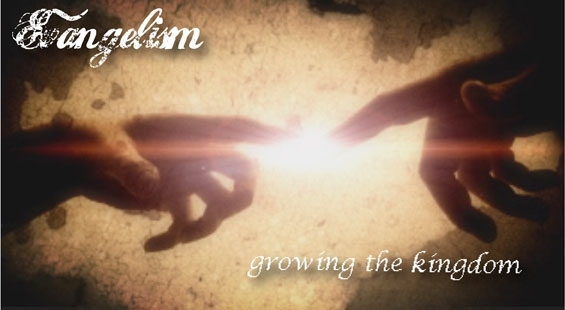
The Kingdom of Heaven is intimately tied with evangelism, but in ways that many do not suspect.
The Kingdom of Heaven is Not Heaven
For many centuries now, at least since the Reformation, and possibly before that, people have understood the “Kingdom of Heaven” (or the Kingdom of God) as being equivalent to “heaven.” People have also noticed that in Scripture, the topics of the Gospel and the Kingdom of Heaven are intimately connected. In many places, the Gospel is the message about the arrival of the Kingdom of Heaven.
And so when people assume that the “Kingdom of Heaven” equals “Heaven” then it seems logical to assume that the gospel message is focused on “How to get to heaven when we die.”
But in recent decades, many Christians around the world have begun to teach and write about the Kingdom of Heaven in a different way. Noticing, for example, in Matthew 6:10 that the prayer of Jesus for the coming of the kingdom is for God’s will to be done on earth, as it is in heaven, many teachers and writers have argued that the Kingdom is not heaven, but rather God’s rule and reign on earth, just as God rules and reigns in heaven.
The Kingdom of Heaven on Earth
With this understanding, the Kingdom of Heaven is already “in heaven” but through the life, death, and resurrection of Jesus, the Kingdom of Heaven is expanding to the earth as well. It is not here fully, but the standard has been placed, and the claim has been made. The present rulers of this age are not happy with the arrival of the Rightful King, and so they fight with tooth and claw to hold on to their power, dominion, and authority.
But we, as followers of Jesus, must continue the work He started in spreading the rule and reign of God across the entire earth and into the hearts and minds of every person. This good news that God is restoring His rule and reign upon the earth is to be spread to all corners of the world, not just by what we say, but also by what we do.

I am convinced that this is the right and proper way of reading Scripture. Therefore, the gospel message is about way more than just how to get to heaven when we die. Certainly, it includes truths about this, but the Gospel does not just concern what happens after we die, but is even more concerned with what happens while we live.
It is a message for the here and now; not just a message for the hereafter. It is a message about how the rule and reign of God has been planted in our own lives, and is spreading and growing to cover every area of our life, and how from us, seeds of the kingdom are being scattered into the lives of all people we come into contact with, with the hope that some of them also come under the rule and reign of God.




This is solid. Right on!
This is a great post! One of the most exciting things I learned during my time during college was the idea of the “already but not yet.” It has forever changed my understanding of the necessity to live in the Kingdom of God NOW.
You know, I really strongly did not like the “already not yet” view when I was in seminary. I was shocked to read your comment! Now I need to go back and re-read some of those books and see if I agree with them more now… ha!
The way we understood the phrase was simply that the Kingdom is “already” here, but “not yet” fully realized. The Kingdom came to earth when God broke into history through Jesus, and has been here ever since. The “not yet” part is celebrated every year with Advent, as we anticipate the coming full realization of the Kingdom.
I think the challenge is to assimilate Jesus’ kingdom message with Paul’s salvation-based message we are more familiar with. We need to ask some hard questions:
What is the kingdom message today? How much of Jesus’ message was the initial announcement, and how much is for today?
Why were Jesus’ and Paul’s messages different? Was it the difference between Jews and Gentiles; between pre and post crucifixion/resurrection; between a society with too much religion and one with too many religions; or what?
How do we transfer all this information into a consistent message and action today? How do we choose which parts of the message are most applicable in each situation?
I have had a first go at answering a little of this in What message? – I know you have read it Jeremy, but others may be interested.
Thanks for re-posting that here. Yes, these are all very good questions that must be asked and answered. Or at least, attempted to be answered.
These are all good ways of understanding this issue. I think of it similarly. Jesus announced the arrival of the Kingdom. We have yet to see certain aspects of it, but it is present nevertheless. Even though it often seems that we are surrounded by another kingdom, we can choose to follow Jesus and be first and foremost part of the Kingdom He came to announce.
“Seeing” the Kingdom is not easy for everyone. Is it merely a tree-covered landscape, or royal grounds containing a palace? Do we see it? Maybe we caught a glimpse and dismissed it.
Where have you seen it? I’ve seen it in my family room, in my neighborhood, in front of Walmart, in the street and lots of other places. (Of course I’m leaving the question of what it looks like open.)
Sam,
Yes, I “see” what you mean. I think. I am working at seeing the Kingdom, but as you have said elsewhere, it takes practice.
I fear sometimes that I am seeing, but not seeing; hearing but not hearing….
For a full-orbed treatment of inaugurated eschatology, i.e., already/ not yet kingdom, read “HEAVEN ON EARTH: Experiencing the Kingdom of God in the Here and Now.” Available in pb/kindle.